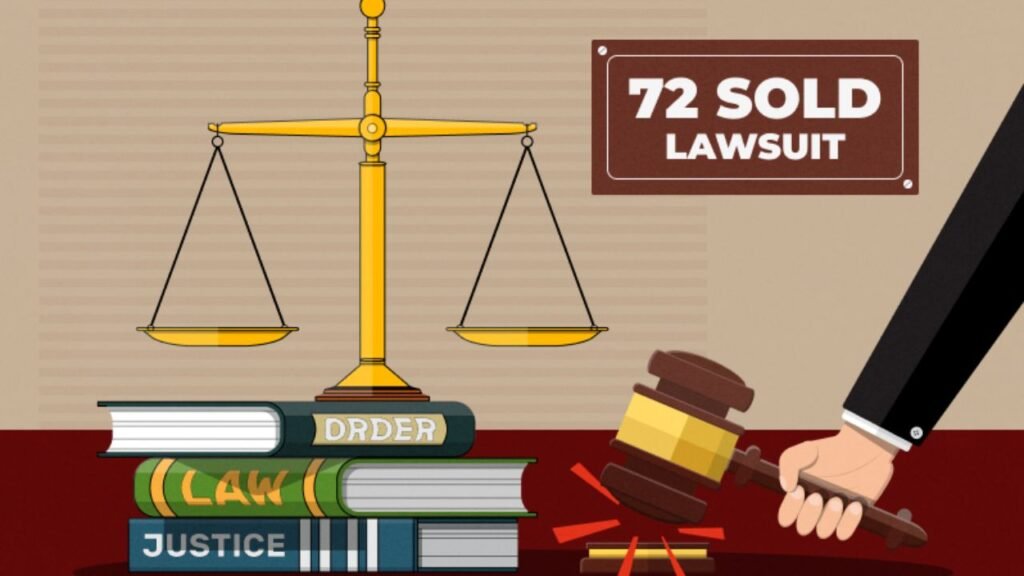The real estate industry has adopted various innovative methods throughout its years of operation. The company 72 Sold lawsuit developed a new selling strategy for real estate properties. Through their operation the company promised to complete house sales within a span of three days. The idea was simple and fast. The fast and easy nature along with the potential profit of the concept won favor with numerous people. The outcome proved different from what was anticipated.
Right after the product release homeowners flooded customer service with notices that brought forward multiple complaints. Some said they were misled. The advertised promises in the advertisements turned out to be false according to various individuals. The creation of the 72 Sold lawsuit emerged due to this situation. Numerous real estate specialists started to debate this issue in their field.
What is 72 Sold and Why Was It Popular?
72 Sold is a home-selling program. It promised to sell homes quickly, within just three days. The model focused on creating competition among buyers to increase the sale price. Sellers were told they could skip the usual long wait and paperwork.
This promise was attractive. Many homeowners wanted fast results. They liked the idea of avoiding long showings, open houses, and stressful delays. This is why 72 Sold quickly gained popularity across the United States.
What is the 72 Sold Lawsuit All About?
The 72 Sold lawsuit is a legal case filed against the company. The lawsuit focuses on claims that the company made false promises. Some homeowners believe they were misled by the company’s marketing. They say the results were not as quick or successful as advertised.
The lawsuit questions if the company followed legal guidelines. It also asks whether the homeowners were given all the important information upfront. If not, then that’s a serious legal issue. This is why the case is under review by legal experts and regulators.
Why the 72 Sold Lawsuit was Filed?
Several people who used the program said their homes were not sold within 72 hours. Others said that the sale prices were not higher than what traditional agents offered. Some even said the company used confusing contracts that were hard to understand.
These repeated issues caused frustration. People felt that the program over-promised and under-delivered. Many of them believed they would get more money, faster. When that didn’t happen, they took legal action.
Key Allegations in the 72 Sold Lawsuit
The main issues in the 72 Sold lawsuit are related to advertising. Homeowners say the marketing was misleading. The company promised fast sales and high offers. But some users did not receive either.
Here’s a table that explains the main allegations:
| Issue Raised | Description |
| False Advertising | Homes did not sell within the promised 72 hours |
| Misleading Price Claims | Properties were not sold at higher prices as claimed |
| Lack of Transparency | Contracts and terms were confusing or hidden |
| Pressure Tactics | Some homeowners felt pushed into signing without full understanding |
These concerns are serious. They have affected many people and are central to the lawsuit.
Real Impact of the 72 Sold Lawsuit on Sellers
Sellers were hit the hardest. Many felt they were promised more than what was delivered. The lawsuit made them question everything.
1. Loss of Trust in Fast-Sale Promises
Many sellers felt let down. They expected homes to sell in 72 hours. That didn’t happen for everyone. Some waited weeks. Others never got the offers they hoped for. This created major doubt in quick-sale programs.
2. Lower-than-Expected Home Prices
One big claim was better prices. But some sellers got less than market value. That was a shock. They trusted the process. But results didn’t match the pitch. This caused frustration and regret.
3. Hesitation Toward Similar Platforms
The lawsuit scared many sellers away. They now avoid fast-selling services. Even if those services are legit. The fear of being misled lingers. This has changed seller behavior across markets.
4. Greater Dependence on Traditional Agents
After this case, many returned to agents. They preferred personal advice. Agents offered full support. Sellers felt safer with someone local. Trust shifted back to old-school methods.
Customer Feedback and the 72 Sold Lawsuit
Sellers had mixed experiences. Some liked the service. Others were disappointed. And it’s the negative feedback that gave rise to the 72 Sold lawsuit. Here’s a look at how customers responded:
| Type of Feedback | Common Themes |
| Positive | Smooth process, polite team |
| Negative | Delayed sales, unclear terms, lower prices |
These varied experiences fueled the legal case. The more complaints came in, the more serious the 72 Sold lawsuit became.
Role of Regulators in the 72 Sold Lawsuit
Regulators play a big role now. They are reviewing how 72 Sold worked. Their job is to check if rules were followed.
1. Investigating Advertising Practices
One key focus is on the ads. Were they honest? Did they match what customers got? Regulators want proof. They want facts, not promises. This step is serious for all companies now.
2. Checking Contract Terms
Regulators are also checking the fine print. Were the contracts fair? Were the terms clear? Many sellers said they didn’t understand them. That’s a red flag. It’s something regulators don’t ignore.
3. Protecting Consumer Rights
The main goal is safety. Regulators protect the public. That’s their job. If a company breaks rules, they step in. The 72 Sold lawsuit triggered this review. It might lead to big penalties.
4. Possible Legal Actions
If violations are found, action follows. It could be a fine. Or even limits on future ads. The company may also need to refund users. These steps make sure the market stays fair.
Real Estate Marketing After the 72 Sold Lawsuit

The 72 Sold lawsuit exposed major gaps. It showed that words matter. What’s in ads must be real. That’s why the whole market is now shifting.
1. Focus on Truthful Ads
Companies can no longer exaggerate. Claims must be backed with facts. “Sell in 72 hours” must mean exactly that. Regulators will be watching closely now. Buyers and sellers expect truth, not hype.
2. Simpler Messaging
Clear words are in. Vague ones are out. People want to know exactly what to expect. New ads now focus on simple promises. No tricks. Just results that match real data.
3. Rebuilding Customer Trust
The lawsuit hurt public trust. Many felt tricked. Now, companies are working to fix that. They are trying to be more open. Some are even changing their models. It’s all about regaining respect.
4. Competitor Reactions
Other companies are adjusting too. They don’t want to be next in line. Some pulled ads. Others changed their pitch. The 72 Sold lawsuit sent a strong message to the entire industry.
Can 72 Sold Recover From the Lawsuit?
The company is still running. But it’s unclear what will happen next. If they lose the case, changes will be required. Here are the possible outcomes:
- They may rebrand and relaunch
- They could owe refunds or settlements
- They may be forced to change ads
If they win the case, they might regain trust. But the 72 Sold lawsuit will leave a lasting mark either way.
The 72 Sold Lawsuit Teaches Buyers a Lesson Too
Buyers often trust what they see online. But fast deals can sometimes hide the truth. The 72 Sold lawsuit shows why it’s smart to ask questions and dig deeper.
1. Be Cautious of Fast Sales
Speed sounds good. But it’s not always safe. Some homes sold fast, but with unclear terms. Buyers must ask about the deal process. Don’t assume everything is fine just because it’s fast. Always know what you’re walking into.
2. Understand How Homes Are Marketed
Some homes may look like great deals. But they might be priced for quick sales. That could mean hidden problems. Ask how the home was listed. Learn about price changes. It helps you make better offers.
3. Look Beyond the First Offer
The first offer may not be the best. In programs like 72 Sold, quick bids are common. But not always fair. Take your time. Ask for comparisons. Make sure you don’t pay more than the home is worth.
4. Get Expert Help Early
Always involve a real estate lawyer. Or a trusted agent. They can explain contracts. They can spot problems. A little help early can save a lot later.
How Agents Should Respond to the 72 Sold Lawsuit
This case also sends a strong message to real estate agents. It shows the risks of over-promising. Agents now must focus more on being clear, honest, and helpful.
1. Stay Honest in All Promotions
Never promise more than you can deliver. Don’t say a home will sell in 3 days unless you’re sure. The 72 Sold lawsuit shows how big promises can lead to big problems. Be real with clients. They’ll trust you more.
2. Explain the Process Clearly
Sellers and buyers need details. Don’t skip steps to sound fast. Tell clients how things work. Let them ask questions. Give answers in simple words. Clear steps build strong trust.
3. Avoid Pushing Clients to Decide
Rushing people hurts your business. Let them think. Let them compare. A good agent helps, not pressures. This case proves pressure turns into legal trouble. Respect your clients’ pace.
4. Review All Ads and Listings
Check what your listings say. Make sure they’re true. Don’t use tricky phrases like “guaranteed sale” unless it’s real. If your ads are honest, your clients stay happy—and you stay safe.
Other Legal Cases Similar to the 72 Sold Lawsuit
Real estate companies face legal issues often. But the 72 Sold lawsuit stands out due to its size and attention. Here’s a quick look at other notable cases:
| Company | Legal Issue |
| Zillow | Misleading home value tools |
| OpenDoor | FTC fine for false marketing |
| 72 Sold | Lawsuit for false promises and unclear terms |
These examples show that laws in real estate are evolving fast.
How to Avoid Getting Caught in Situations Like the 72 Sold Lawsuit
The best way to avoid trouble? Ask questions. Do your homework. Never trust big promises blindly. Here are a few safe steps:
- Read every contract carefully
- Compare multiple services before choosing
- Look at customer reviews
- Get advice from licensed professionals
These tips can protect both sellers and buyers from falling into similar traps.
Final Thoughts on the 72 Sold Lawsuit
The 72 Sold lawsuit is a major event. It tells us a lot about how the real estate world is changing. It highlights the need for trust, truth, and proper service. Sellers want results. But they also want honesty. Buyers want value. But they also want fairness. Real estate is about people’s homes. And that means companies must act with care. This lawsuit may lead to better laws. It may force businesses to do better. And that’s a good thing for everyone.




